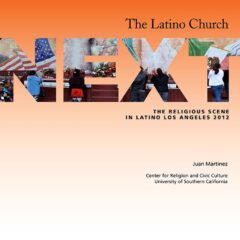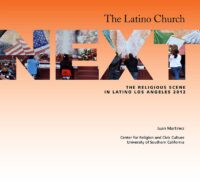The word mañana has many connotations. Though it literally means “tomorrow,” in common parlance it usually just means “not today.” For some mañana carries the negative connotation of putting things off indefinitely. Latino theologian Justo González also recognizes that mañana has sometimes become the “discouraged response” of those who have worked to bring change, only to see that their efforts never seem to become reality. But mañana is also the “radical questioning” of today, a belief that God is yet at work in the world creating something new. To be a Latino Christian is fundamentally to believe that the God who continues to interact with humanity will continue to do so in the future. It is a willingness to question and to challenge the “innocent” reading of the history of Los Angeles (and the U.S.), calling the country to address its corporate sins, that it can continue to grow toward a greater mañana. Currently the most controversial issue affecting Latinos’ mañana is immigration reform.
The combination of a weakened economy and the overall changing demographics of the country have created an “anti-Latino” environment in some parts of the country that expands to Los Angeles. The fairly constant legal as well as undocumented migration from Latin America has created complex issues related to national identity, how to deal with a broken immigration system, relations between the United States and Latin America, transnationality and the place of minority communities in this country. In practical terms this means that for many people in Los Angeles practically all Latinos are assumed to be undocumented, particularly if they are speaking Spanish. But it also creates dilemmas within the community.
How does one confront policies that for many Latinos seems like “legalized” racism (such as SB1070 in Arizona), but that enjoys the support of the majority of people in the United States, even if they might result in racial profiling? Many Latinas have undocumented relatives, friends or fellow employees. How does one walk with them? How does one deal with the federal immigration system, which sometimes accepts and sometimes rejects the undocumented—and sometimes rejects those who have a legal right to be here?
Migration patterns also create ministry opportunities and responsibilities for Latina churches. The existing legal flow means that churches need to be constantly aware of new immigrants and how to best serve them. But the undocumented community presents a different set of challenges. Most of them have become part of the national social fabric, yet have no way to influence decisions made about them. Most of them are part of Latino parishes or churches. What does pastoral care and support mean in relationship to these people and their U.S.-born children? Will Latino Christians choose to seek acceptance among those who are anti-immigrant, or will they take the risk of standing with those who have no voice? Spanish has now surpassed English as the second most spoken “first” language in the world, behind Mandarin, and the United States is one of the largest Spanish-speaking countries in the world. Even though a significant percentage of Latinos do not speak Spanish, the number of Spanish-speakers in this country continues to grow.
In Los Angeles this means that Univisión competes with English-language networks for market share. El Piolín and El Cucuy compete with each other for the number one position in the radio market, with English-language disc jockeys behind them. Though Latinos have not demonstrated a strong commitment to the language after two to three generations, the role of Spanish in the public arena continues to increase. It currently seems likely that the number of Spanish speakers in Los Angeles will continue to grow, though the total will be only a percentage of the Latina community. All of the census projections assume that the largest area of future growth in the Latino community will be among U.S.-born Latinos. They are the majority and a growing percentage of the Latino population. Latina young people are going to be the single largest area of demographic growth in various parts of the United States. In California, Latino children are already the largest group starting school. Clearly Latina youth represent all of the diversity related to Latino ethnic identity maintenance.
Latino youth are culture creators. In the midst of their experimentation they are drawing from many sources and developing subcultures that will impact how they define themselves in the future. They are fleeing, returning, forming and reforming the culture they received from their parents, mixed with the cultural influences of others. Many are choosing to marry outside of the Latino community, though the vast majority marry other Latinas. But since Latinos are the single largest group in Los Angeles it is fairer to say that others are marrying into the Latino community. These young people will shape the future of the Latina community. Many of them will be the pastors and priests of Latina churches that will shape the future of Latino religion in the city. They will clearly shape mañana.
Juan Martinez is a former fellow with the USC Center for Religion and Civic Culture.


